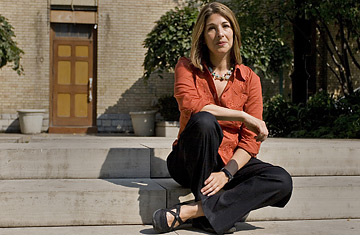
Naomi Klein is a Canadian journalist, author and activist.
(2 of 2)
Almost 60 pages of your book are dedicated to notes and citations. Can
you talk about the research involved in this project?
The book is combination of my own reporting in Iraq, Sri Lanka after the
tsunami, New Orleans after the levees broke, Argentina after the economic
collapse in 2001. So, reporting in disaster zones combined with a great
deal of historical reading about the key junctures where the ideology of
unfettered capitalism leapt forward — the southern cone of Latin America
in the '70s, Bolivia in the '80s, [Margaret] Thatcher's Britain
during the Falklands War, Russia in the mid-'90s under Boris Yeltsin, the
Tiananmen Square massacre.
I actually had seven research assistants at various points. We set up a sort of research institute to do a lot of research in a relatively short period of time. It took four years to do this book but it covers so much ground that it really did require this extraordinary team of people. And then we had four lawyers vetting the material through a really rigorous process of having to produce the original documents for every claim in the book.
And what type of impact do you hope this book will have?
There's been a huge amount of investigation and analysis about each of these
key junctures and I'm drawing on that analysis. You asked me about my
research, and the first draft of history was really written by the
journalists in the field and a lot of it contained the talking points that
various powerful institutions wanted to get out there at the time — you
know, that Boris Yeltsin was standing up for democracy when he called the
tanks in on Parliament. But a couple decades later you have a body of
literature in each of these geographic locations whether its Latin America,
Russia, Poland, China, where a second draft of history is emerging, and I'm
citing these texts, many of which are academic texts. So all I'm doing with
the book is connecting the dots and one of my goals was to try to connect
this body of research that is location specific and put it into a context
that is as global as the ideology itself, which is a ridiculously ambitious
goal.
Then the other goal is that, the more I learn about shock the more I understand that shock tactics work best when we are starved of information and are taken by surprise. Shock tactics rely on that element of surprise. They're about a gap between an event and the information we have to explain those events. So the sort of deeper reason why I wrote the book is because I believe that when we understand those tactics we become more shock resistant. That the mere act of sort of unpacking and looking at how we regress in moments of trauma is the best form of resistance against that very regression when the next shock hits. So even though much of the material in the book is despairing, my hope is that the overall effect of it is empowering.
You're looking for the book to have a global scope. So, who exactly is
your audience?
The book is reaching mainstream audiences where its been released. It's a
best seller and it's already the number one book in Canada right now, which
is where I released it first because that's where I'm from. I think it's
fair for me to say that at least in my own country I'm reaching the same
people who are reading Harry Potter apparently. Why should we
restrict this into some narrow audience? Who doesn't want to have a better
grasp on how we got to where we are? The book tries to do that so I don't
see why this should be a sort of wonky exercise for people who like to read
big books on politics.
What type of reaction have you received so far about the book?
Well its certainly been mixed. The Guardian in England had the serial
rights to the book so they ran four extracts in the paper and then they
commissioned a bunch of people on different ends of the political spectrum
to respond to different sections of the book. And then they've been debating
it wildly online. But the conclusion was: "Wow, you either love her or hate
her." Not much neutrality. And you know, in theory, I wrote the book to help
spark a debate and certainly the debate is happening. I think the debate is
really healthy. If I got universal approval for this thesis, it would
contradict my thesis. My thesis is that this is a war and it's a war with
very real casualties, so if I just got lots of pats on the head from The
Financial Times and The Economist, then I suppose my thesis would
be wrong. So I can't complain.
This book seems much more serious of an undertaking than No Logo. How would you say you've changed from that book to this one? The tone of No Logo was a little bit girlish and anecdotal. The gravity of this material made me want to take myself out of it as much as possible. It felt like a distraction and it felt like anything that trivialized the material was inappropriate. So I concentrated on clarity. I really didn't want writing that was show-off or cutesy. I really poured my creative energies as a writer into the structure, and the sort of narrative flow of the argument and backing up the research.
